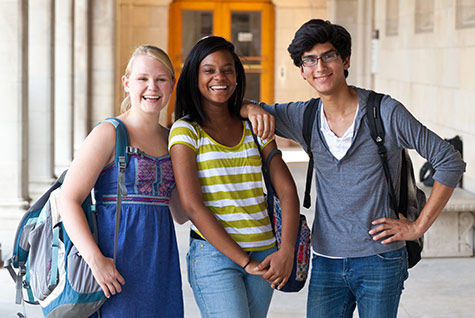High school students have new options this summer at Washington University in St. Louis. High School Summer Experiences offers students the chance to experience all facets of college life in both for-credit and noncredit options.
Students come from across the United States and around the world to attend these programs. Need-based scholarships are available, and the programs partner with a number of foundations to bring applicants with limited financial resources to WUSTL at no cost to the student.
“We encourage a diverse range of students to apply, and the common denominator is that they are interested in learning and have had sufficient previous academic success,” said Pat Matthews, director of Summer School and associate dean of University College in Arts & Sciences. “Our directors work with students to make sure they are in programs appropriate for their interests and abilities.”
Matthews said the programs’ goal is to prepare students to succeed in college.
“That means not only a rigorous, high-quality educational experience,” she said, “but also learning study skills, figuring out how to negotiate with a roommate, developing friendships and balancing social life with academics, exploring possible majors, as well as experiencing independence and the responsibility that goes along with it.”

High School Summer Scholars
In this five-week program, participants enroll in two undergraduate courses and are supported by college-success seminars and academic support groups. Students prepare for college admissions, learn more about college majors and participate in social activities and trips.
Students may choose two of the undergraduate courses offered, with options in foreign language, humanities, math, science and social sciences, plus pre-professional areas of study such as pre-business and pre-law. Visit the 2014 course listings for full descriptions of course options.
In addition to the residential option, the program is offering two new options:
Scholar-athlete option: Students take one undergraduate course and also enroll in Athletic Development and Human Performance, a noncredit course aimed at increasing physical literacy. During this program, students will:
- improve their level of fitness through conditioning and weight training.
- learn about nutrition, the risks of supplement use, kinesthetics and injury prevention, and sports psychology.
- meet with student-athletes and coaches to learn more about the expectations for collegiate athletes and best strategies for balancing the classroom with the playing field.
Commuter option: Participants enroll in two undergraduate courses while commuting from home. Students enjoy all of the supplemental academic and social programming options available to the residential students.
The residential program fee includes housing for five weeks, a full meal plan, most social activities, access to campus facilities, such as the Athletic Complex and the Olin Library, and a Metro pass. The commuter program fee does not cover housing and includes a partial meal plan.
There are two High School Summer Scholars sessions:
Session A: June 8-July 12, 2014
Session B: July 13-Aug. 15, 2014
Download application materials here. Learn more about fees and scholarship assistance. The deadline for Session A is May 2; the deadline for Session B is June 6. Students are encouraged to apply early.
High School Summer Institutes
These one- to three-week, noncredit institutes specialize in an area of interest or field of study. Institutes combine traditional class and lab curriculum with organized field trips, guest lectures and hands-on activities. The programming includes academic support and social activities. The institutes are open to current high school students from across the country and around the world.
2014 institutes:
Pre-engineering Institute
Students discover the exciting and diverse fields of biomedical, environmental, mechanical, computer and electrical engineering. This institute is offered in partnership with the School of Engineering & Applied Science.
Global Leadership Institute
Students combine classroom study of seminal pieces that informed policymakers and influenced the way global leaders thought with activities such as debates and policymaking and negotiation simulations.
Young Leaders Institute
Students develop leadership skills, meet community leaders and work in teams to research and analyze a local issue and develop a community service project that addresses it.
Ancient Discovery
Students discover ancient cultures and civilizations, examine artifacts and experience archaeological excavation.
Pre-medical Institute
Three weeks, expanded with two tracks.
- The research track includes hands-on labs that teach medical diagnostic tests and experiments such as PCR, IHC, bacterial culturing and genetic sequencing. Students also tour state-of-the-art research labs and participate in current research studies conducted at the School of Medicine.
- In the clinical track, students practice basic medical techniques, including taking vital statistics, suturing and taking patient histories. Led by current Washington University medical students, these sessions will take place in the medical school simulation rooms.
Writing Institute
Two weeks, expanded with two tracks:
- The creative writing track is a traditional writer’s workshop. Students discuss published work, create pieces using innovative prompts and share work with classmates. Students also explore the thriving St. Louis literary scene, meet professional and creative writers and learn about various writing-related professions.
- The academic writing track is designed to hone writing skills in preparation for college. Students learn to generate original ideas, organize thoughts and convey them to a specific audience, as well as how to approach difficult texts and analyze complex arguments.
The application deadline for the institutes is April 1, and students are encouraged to apply as early as possible. Download application materials here. See individual institute pages at the High School Summer Institutes page for age requirements and academic guidelines. Program fees vary by institute and include all academic and residential expenses. Partial scholarship assistance is available. See 2014 Institute Program Fees for more information.
“Our students tell us that the main benefits of our high school summer programs are experiencing independence, trying out a major area of study, and forming friendships with peers from across the country and internationally,” Matthews said. “After completing one of our programs, high school students should be more prepared to succeed in college.”